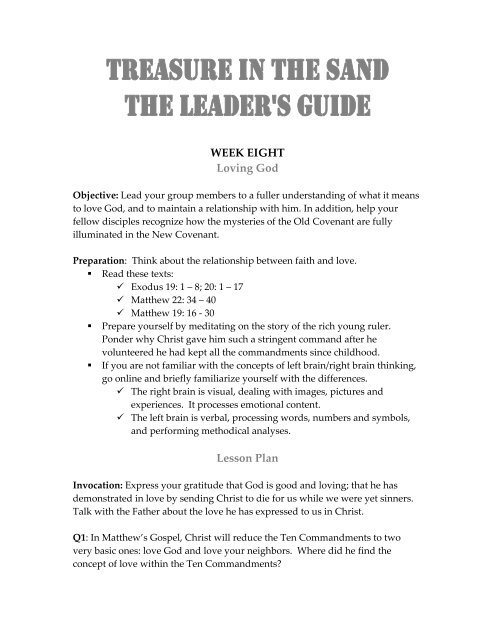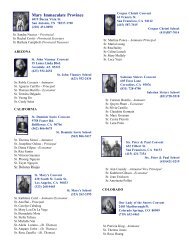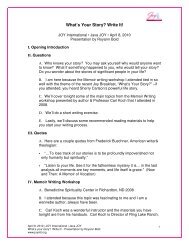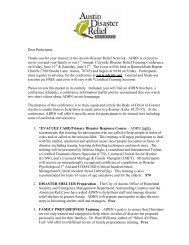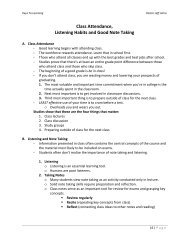WEEK EIGHT Loving God Lesson Plan
WEEK EIGHT Loving God Lesson Plan
WEEK EIGHT Loving God Lesson Plan
Create successful ePaper yourself
Turn your PDF publications into a flip-book with our unique Google optimized e-Paper software.
<strong>WEEK</strong> <strong>EIGHT</strong><br />
<strong>Loving</strong> <strong>God</strong><br />
Objective: Lead your group members to a fuller understanding of what it means<br />
to love <strong>God</strong>, and to maintain a relationship with him. In addition, help your<br />
fellow disciples recognize how the mysteries of the Old Covenant are fully<br />
illuminated in the New Covenant.<br />
Preparation: Think about the relationship between faith and love.<br />
• Read these texts:<br />
Exodus 19: 1 – 8; 20: 1 – 17<br />
Matthew 22: 34 – 40<br />
Matthew 19: 16 - 30<br />
• Prepare yourself by meditating on the story of the rich young ruler.<br />
Ponder why Christ gave him such a stringent command after he<br />
volunteered he had kept all the commandments since childhood.<br />
• If you are not familiar with the concepts of left brain/right brain thinking,<br />
go online and briefly familiarize yourself with the differences.<br />
The right brain is visual, dealing with images, pictures and<br />
experiences. It processes emotional content.<br />
The left brain is verbal, processing words, numbers and symbols,<br />
and performing methodical analyses.<br />
<strong>Lesson</strong> <strong>Plan</strong><br />
Invocation: Express your gratitude that <strong>God</strong> is good and loving; that he has<br />
demonstrated in love by sending Christ to die for us while we were yet sinners.<br />
Talk with the Father about the love he has expressed to us in Christ.<br />
Q1: In Matthew’s Gospel, Christ will reduce the Ten Commandments to two<br />
very basic ones: love <strong>God</strong> and love your neighbors. Where did he find the<br />
concept of love within the Ten Commandments
Q2: Dr. Francis Schaeffer has written, “Man can understand and respond to the<br />
One who, having made him and communicated with him, called upon him to<br />
show that he loved Him by a simple command: ‘Don’t do this.’” Does this<br />
statement make sense to you and would you agree with it<br />
Read Exodus 19: 1 – 8<br />
Instruction:<br />
Review the basic details of this text and elaborate on the ideas that speak most<br />
powerfully to your life.<br />
• 19:1 Ninety days into their desert journey, the Hebrews finally reach<br />
Mount Sinai where they are called to worship the Almighty.<br />
Three months may not sound like a long time to your or me, but<br />
these 90 days have been spent on the move in the desert.<br />
The trip has taken longer than one would have expected because<br />
instead of traveling due East, the group has traveled far to the<br />
south and then back north and east.<br />
• 19:3 <strong>God</strong> calls to Moses from the mountain and explains that his<br />
relationship with the Jews will be unlike his relationship with any other<br />
nation or people. It will reflect two elements:<br />
The works of <strong>God</strong> which the people have experienced, and are<br />
called upon to remember for generations.<br />
The words of <strong>God</strong> which the people are called to hear and keep for<br />
future generations.<br />
• Illustration: You’re probably familiar with the concept that the opposite<br />
halves of the human brain perform different functions.<br />
The right brain is visual and deals with images and experiences at<br />
an emotional level.<br />
The left brain is verbal and processes words, numbers and<br />
symbols in an analytical fashion.<br />
Notice that <strong>God</strong> is carefully preparing his people to know him and<br />
learn about him through experiences that draw on both sides of the<br />
brain. In this way, <strong>God</strong> calls for a whole hearted response from us.<br />
• 19:7 Moses communicates this basic preamble from <strong>God</strong> to the people.<br />
They agree to enter this kind of relationship/covenant with <strong>God</strong>. So <strong>God</strong><br />
tells them to prepare for an unforgettable and once in history meeting<br />
with him.
Processing the Text:<br />
Ask leading questions to help your friends think about the ideas that lie at the<br />
heart of this relationship between <strong>God</strong> and his Chosen People.<br />
• What will the custom of remembering the works of <strong>God</strong> accomplish in the<br />
lives of each generation of Israelites<br />
• Will keeping <strong>God</strong>’s commandments make the Jews sufficiently righteous<br />
to be pleasing to <strong>God</strong><br />
Will keeping these commandments make them distinctive and set<br />
them apart from other nations<br />
Will keeping these commandments demonstrate a deeper<br />
relationship between Israel and the Almighty<br />
• 20:1-6 Does this covenant between <strong>God</strong> and man compare more favorably<br />
to a business partnership, a religious partnership, or a marriage<br />
• Q: Some have commented that the tenth commandment, which prohibits<br />
covetousness, is the hardest command to keep. Perhaps. But why is the<br />
first commandment foundational to everything that follows<br />
Personal Application:<br />
Lead your students to consider our utter inability to be righteous before <strong>God</strong>,<br />
and our core need to know our Creator and be in relationship with him.<br />
• Russian author Alexander Solzhenitsyn became a follower of Christ while<br />
trapped in a miserable, brutally cold Soviet Gulag. His confession of faith<br />
resulted in part from the sacrificial death of another Christian he knew.<br />
He later explained: “The meaning of earthly existence lies not as we have<br />
grown used to thinking, in prospering, but in the development of the soul.”<br />
How do the Ten Commandments reveal <strong>God</strong>’s loving desire to<br />
develop our souls<br />
How does our emphasis on soul development demonstrate love for<br />
an Eternal <strong>God</strong><br />
• In the incident with the rich young ruler, Jesus clearly wanted the young<br />
man to recognize his complete failure to keep the commandments since<br />
childhood. How did his directive- “sell all you have and distribute it to<br />
the poor-“ underscore a failure to keep the Commandments<br />
• Do you believe that most Americans (and many Christians) are guilty of<br />
idol worship in our 21 st Century culture<br />
• Are there any idols currently on display in your life
Concluding Question:<br />
German martyr Dietrich Bonhoeffer wrote simply, “Only he who believes is<br />
obedient. Only he who is obedient believes.” Would you agree with him<br />
Benediction:<br />
Pray for a hunger for <strong>God</strong> and a willingness to surrender in love regardless of<br />
circumstances.


